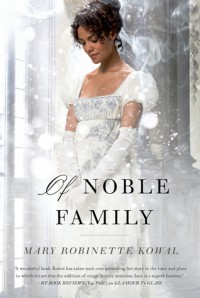Of Noble Family
 This book was horrifying, terrifying, horrible, emotional, wonderful, amazing.
This book was horrifying, terrifying, horrible, emotional, wonderful, amazing.At twice the length of previous novels in this series, this one definitely had something to say. It said it eloquently and with a passion that cannot help but stir.
Jane and Vincent travel to the Hamilton Estates in Antigua after learning of the death of his father. Trapped there by circumstance, they come face to face with the harsh realities of the slave plantations of Britain's distant Caribbean holdings and quickly become caught up in the life of the estate.
This was a novel that stands solidly on the strength of the previous novels in the series. Any gentleman or lady of the time who believed in abolitionism (as Jane and Vincent did) would have been shocked by the true situation in Antigua - and indeed, as it is pointed out in the book, many abolitionists had allowed themselves to believe that simply by banning the sale of slaves, they had in fact eradicated the evils of slavery - something that was definitely not the case.
However it is the character building that has taken place over the last three novels, the sense of justice and compassion that we have already seen displayed by the main characters and Vincent's experiences both with Vincent's father and the Napoleonic forces, that makes their response so believable and the story so wonderful. They are truly horrified by what they see and feel a deep compassion. Not merely "compassion for fellow humans", that weaker but still important emotion that led the abolitionists in London to fight the slave trade, often without any personal experience or stake in it. But rather, a deep personal compassion that leads them not only to seek to improve conditions of the local slaves, but to acknowledge and accept as family those who, by resemblance alone, obviously were just that.
It was this extensive background work that also leant credence to the idea that slaves in such a position might come to respect and trust the main characters, Jane who's health condition and actions draw sympathy from the female slaves, and Vincent whose scars mark him as one who has suffered, if not in the same way or as badly as the slaves (as he himself points out), at least in a way they can understand.
The story is powerful and sensitive, it treats its subject with respect and yet pulls no punches, draws no veils over the abuses that took place on estates such as the one described. It can be an emotional roller coaster at times, drawing both tears and anger in ways that few books I have read can manage.
It is easily the greatest novel I had read this year, perhaps in quite a few years, and without a doubt the best novel in a series that started in real style and has only gotten better since.





